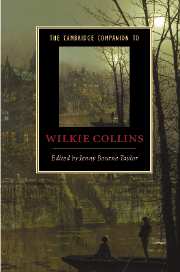Book contents
- Frontmatter
- Introduction
- 1 Collins’s career and the visual arts
- 2 The early writing
- 3 Collins’s shorter fiction
- 4 Collins and the sensation novel
- 5 The Moonstone, detective fiction and forensic science
- 6 The later novels
- 7 The professional writer and the literary marketplace
- 8 The marriage plot and its alternatives
- 9 Collins and Victorian masculinity
- 10 Collins and empire
- 11 Disability and difference
- 12 Collins and the theatre
- 13 The afterlife of Wilkie Collins
- Further reading
- Index
- Series List
12 - Collins and the theatre
Published online by Cambridge University Press: 28 January 2007
- Frontmatter
- Introduction
- 1 Collins’s career and the visual arts
- 2 The early writing
- 3 Collins’s shorter fiction
- 4 Collins and the sensation novel
- 5 The Moonstone, detective fiction and forensic science
- 6 The later novels
- 7 The professional writer and the literary marketplace
- 8 The marriage plot and its alternatives
- 9 Collins and Victorian masculinity
- 10 Collins and empire
- 11 Disability and difference
- 12 Collins and the theatre
- 13 The afterlife of Wilkie Collins
- Further reading
- Index
- Series List
Summary
‘But if I know anything of my own faculty it is a dramatic one.
– Wilkie Collins (1862)Victorian theatre 1850–1880
Wilkie Collins liked the theatre, wrote plays and published highly theatrical novels, many of which he adapted for the stage, and his engagement with the theatre spanned the whole of his writing life. During the late 1840s he had been involved in private performances with John Everett Millais, William Holman Hunt, W. P. Frith and Edward Ward in the Collins family household in Blandford Square, and he first met Charles Dickens through amateur theatricals when Augustus Egg persuaded Collins to undertake the part of the valet in Edward Bulwer-Lytton's Not So Bad As We Seem, to be performed by the Guild of Literature and Art. Dickens's amateur performances were fuelled by his own enthusiasm for acting, while ostensibly aimed at raising funds for charitable or benevolent causes. His reputation (and often the reputations of his fellow-actors) ensured maximum exposure, turning the performances into significant public and private events rather than replicating amateur theatricals in the more homely sense of that activity. Through his involvement in Dickens's company Collins laid the ground for future theatrical collaboration with the novelist.
Collins also immersed himself in visits to the professional theatre, and had been a keen theatregoer since visiting the Paris theatres with Charles Ward in the mid-1840s. While much theatrical activity centred on the West End of London, there were also neighbourhood theatres scattered throughout the rest of the metropolis, concentrating more often than not on popular melodrama. Professional theatre was also strong in the provinces, with new theatres opening in such industrial centres as Liverpool and Manchester.
- Type
- Chapter
- Information
- The Cambridge Companion to Wilkie Collins , pp. 168 - 180Publisher: Cambridge University PressPrint publication year: 2006
- 3
- Cited by

